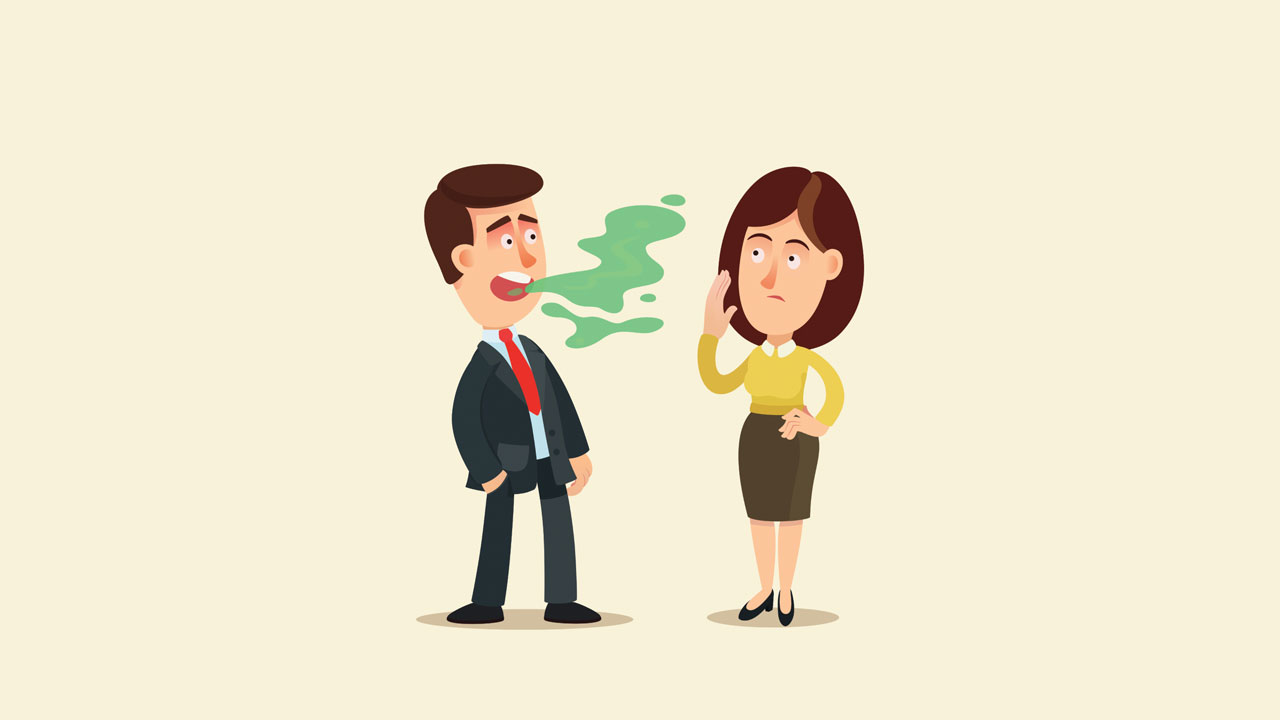How To Prevent Bad Breath

Bad breath is a common ailment that we all have from time to time. It can be embarrassing and even a sign of serious oral health issues. Bad breath, also known as halitosis, has several causes, from dietary choices to gum disease and dry mouth.
To prevent bad breath, you should brush, floss and use mouthwash consistently. You should also stay hydrated, see your dentist twice a year, and avoid breath-souring foods.
Brush, Floss, and Mouthwash Regularly
Brushing your teeth alone is not shown to significantly reduce bad breath. When tooth brushing is combined with mouthwash and tongue brushing, there is a significant reduction in bad breath-causing compounds called volatile sulfur compounds.
Tongue cleaning reduces the effect of tongue coat, one of the main contributors to halitosis. Using mouthwash ensures that the top of the mouth, cheeks, and under the tongue are clean as well.
Flossing removes plaque buildup between the teeth. Plaque leads to volatile sulfur compound creation and causes bad breath. Brushing and flossing remove plaque, while tongue cleaning and mouthwash remove any existing volatile sulfur compounds from your mouth. The result is a mouth free of bad breath.
Stay Hydrated to Solve Dry Mouth
A dry mouth increases plaque buildup because saliva flushes away the halitosis-causing plaque. Dry mouth can be caused by dehydration, medication and is a symptom of many other ailments like thrush. Hydration is the basis for any dry mouth relief. If that is not enough, you can try stimulating your salivary glands by chewing on sugar-free gum.
See your dentist if your dry mouth does not go away with increased hydration and saliva stimulating practices like chewing gum. They may recommend artificial saliva or oral rinses to supplement your lack of saliva.
See Your Dentist Twice a Year
There are many reasons you should visit your dentist twice a year, one of them being bad breath prevention. The main way your dentist prevents bad breath is by performing a deep clean on your teeth.
Even with excellent oral hygiene practices, plaque can solidify into tartar, which only a dentist can remove. Tartar produces the same volatile sulfuric compounds as plaque does, so removing it is vital for preventing bad breath.
Additionally, if tartar goes a long time without removal, it can cause a gum disease called periodontitis. Periodontitis is known to cause bad breath that cannot be removed by brushing, flossing, or tongue cleaning. Avoid developing periodontitis by visiting your doctor for deep cleanings that include tartar-removing procedures like scraping and planing.
Avoid Bad Breath Causing Foods
Some foods cause bad breath not by coating your mouth with unsavory smells but by affecting the air you exhale out of your lungs. Onions, garlic, and spices are broken down and enter your bloodstream.
When gas transfusion occurs from the blood into the lungs, these bad-breath molecules transfer to exhaling air and cause bad breath. Avoid these foods when you know you want your breath to be fresh.
Breath Easy With Hinsdale Dental
With proper oral hygiene practices, twice-yearly dental visits, dry mouth remedies, and avoidance of certain foods, you can prevent bad breath. If your bad breath continues after you do all of this, then visit your dentist, as your bad breath could be caused by an underlying condition like diabetes.
At Hinsdale Dental, we have over 60 years of experience providing cosmetic, preventive, restorative, and implant dentistry. Contact us today to set up a visit or to learn more about our dental services.
Return to Blog